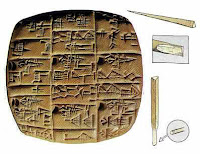Ever notice people who scribble
constantly while attending a talk? I do
because I don’t take notes well. In fact, I hardly take notes at all. I find
note-taking gets in the way of attentive listening. I’m afraid I’ll miss something if I divert my
attention to writing something
down. Note-taking is a different activity than
actively listening. So when I interview an expert to learn about
his/her field for a project I’m working on, I bring along a tape recorder. The only notes I take are about specifics—the
spelling of a name, or a particular recommended reading, or a website I should
visit. Later, when I am synthesizing
material in my own writing, I can
always double check my memory about what I heard with the tape recorder. I have come to understand that my memory is
quite good. And, as a result, I’ve come to rely on it. If I’m worried about forgetting some of the
details after listening all day, I
write my notes in the evening.

For my first term paper when I was in
college, I learned from a graduate student that 3”x 5” note cards about the research were the order of the day and I
diligently wrote them. But, today, when
I’m reading to learn, I find it
disruptive to write notes. That’s why I
found Deb Heiligman’s post A Modest Proposal (for Doing Research with Kids)
from three years ago so memorable. When I’m
trying to grasp concepts the best way for me to learn is to read several different sources on the
same subject. It is only when you can articulate a concept in your own words
that you truly “own” it. So I also use Deb’s technique of only making a note
when something jumps out at me and I know that I’ll want to revisit it.
But doesn’t the act of writing also strengthen memory? The many times I forget to bring along the
grocery list I had recently created makes no difference at all in collecting every
item on that list into my shopping basket.
We authors are verbally articulate about the material in our books
because we’ve thought about it and written about it and, as a result, remember
it better. The many pundits who speak so well on news talk shows are
all excellent writers. Good speaking comes from having written and
practicing by engaging in substantive conversations.
The Common Core State Standards “…..require
that students systematically acquire knowledge in literature and other
disciplines through reading, writing,
speaking, and listening.” To become an articulate, educated person
requires interaction of all four of these activities, which I’ve bold-faced in
this post. I’m not sure where note-taking fits into this process. I have a hunch that it’s one of those highly
individualized quirks that everyone has to discover independently. In
other words, we each have to figure out what works best in our personal
acquisition of knowledge. This could be
a sub-text of the CCSS. Although becoming educated involves all four activities,
how you make it work for yourself can
be discovered only empirically. There is
no one right way, one size fits all. It
is this process of self-discovery that needs to be communicated to teachers and
students.

1 comment:
I have my own quirky way of taking notes. I assume many other people do too. What I think needs to be shared is that it's ok to develop your own style of sifting, sorting, and responding to information. It would be helpful to be able to share with students some examples of how different people do it.
Post a Comment